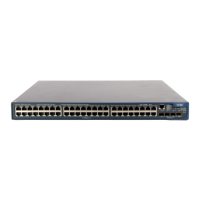Operation Manual – DHCP
H3C S3600 Series Ethernet Switches-Release 1510 Chapter 2
DHCP Server Configuration
2-1
Chapter 2 DHCP Server Configuration
Note:
The contents of this chapter are only applicable to the S3600-EI series among S3600
series switches.
2.1 Introduction to DHCP Server
2.1.1 Usage of DHCP Server
Generally, DHCP servers are used in the following networks to assign IP addresses:
z Large-sized networks, where manual configuration method bears heavy load and
is difficult to manage the whole network in centralized way.
z Networks where the number of available IP addresses is less than that of the hosts.
In this type of networks, IP addresses are not enough for all the hosts to obtain a
fixed IP address, and the number of on-line users is limited (such is the case in an
ISP network). In these networks, a great number of hosts must dynamically obtain
IP addresses through DHCP.
z Networks where only a few hosts need fixed IP addresses and most hosts do not
need fixed IP addresses.
2.1.2 IRF Support
In an IRF (intelligent resilient framework) system, DHCP servers operate in a
centralized way to fit the IRF environment.
z DHCP servers run (as tasks) on all the units (including the master unit and the
slave units) in a Fabric system. But only the one running on the master unit
receives/sends packets and carries out all functions of a DHCP server. Those
running on the slave units only operate as the backup tasks of the one running on
the master unit.
z When a slave unit receives a DHCP-REQUEST packet, it redirects the packet to
the DHCP server on the master unit, which returns a DHCP-ACK/DHCP-NAK
packet to the DHCP client and at the same time backs up the related information to
the slave units. In this way, when the current master unit fails, one of the slaves
can change to the master and operates as the DHCP server immediately.
z DHCP is an UDP-based protocol operating at the application layer. When a DHCP
server in a fabric system runs on a Layer 2 network device, DHCP packets are

